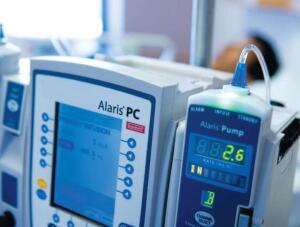by
Keith Loria, Reporter | September 15, 2010

The Alaris Infusion
System from CareFusion
This report originally appeared in the September 2010 issue of DOTmed Business News
Incorrectly programming IV pumps has been one of the most common types of medication error, and when mistakes happen concerning critical drugs, it can result in serious adverse drug events.
“IV pumps have come a long way since the 1950s when they were developed,” says Gale White, vice president of the infusion systems division for B. Braun Medical Inc. “Technology has been developed [to] control the fluids much better. Smart systems within the pump make the pump do a lot of basic thinking and some of the calculations that nursing professionals at the bedside used to have to do.”



Ad Statistics
Times Displayed: 46324
Times Visited: 1408 MIT labs, experts in Multi-Vendor component level repair of: MRI Coils, RF amplifiers, Gradient Amplifiers Contrast Media Injectors. System repairs, sub-assembly repairs, component level repairs, refurbish/calibrate. info@mitlabsusa.com/+1 (305) 470-8013
Infusion pumps with dose calculation software are known as “smart pumps,” and offer the capability for a hospital to pre-program its standard concentrations and to program upper and lower dose limits, which reduce possible adverse drug events involving intravenous medications.
“When implemented correctly, the pump will alert the nurse if the pump has been programmed outside of safe limits and are designed to prevent administration of doses that are considered by the hospital to be extremely unsafe,” White says. “One of the things we have done is to try to make them simpler so the user doesn’t have to make as many decisions and isn’t distracted by the alarms or indications given to them.”
It is believed that more than 50 percent of all hospitals have already made the switch to smart pumps and that in the next decade the number will be closer to 80 percent.
“Integrating with hospital IT systems is one aspect of innovation that will be critical in the years ahead,” says Gordon LaFortune, senior vice president and general manager for infusion systems for CareFusion.
Industry buzz
In April, the U.S. Food and Drug Administration issued the draft guidance, “Total Product Life Cycle: Infusion Pumps—Premarket Notification [510(k)] Submissions,” focusing on infusion manufacturing companies.
“The action of the FDA over the last few months with the pump guidelines and their approach to how they regulate the industry is what people in the industry are talking about,” says LaFortune. “In some ways, it’s too early to tell what this will mean, as we digest the guidelines and understand what it is we have to do to comply, but the broad implications is that innovation will still happen, but the timeframe to get approvals will be longer, more expensive and we’re going to have to get approvals more often than we have in the past.”

